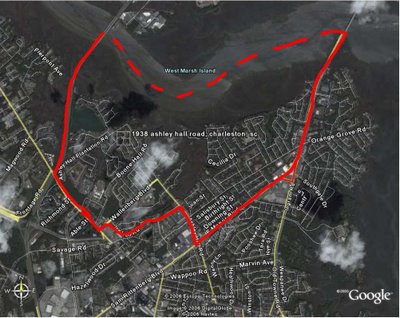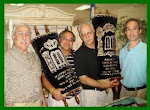"Being orthodox is more than going to services, keeping kosher and observing the Sabbath and holidays. We should live our life with dignity and show respect for others whether we agree with them or not." The President’s message - October 2006, BSBI Messenger
____________
I have heard and read these ideas before, and I find them quite objectionable. Now, if they were spoken by an observant person, addressing the behaviour of another observant person, I would have no problem. In that context, they are quite correct.
But from where it comes in the BSBI Messenger, I have a very deep and vexing problem with it.
You see, it is a mask, a foil. From behind this, those of us in the congregation, who have been observant, and those who are striving to be more observant, are being provoked and insulted.
Does that include me? Well, I may keep more than most, but I am less than fully observant, and keep far less than many. Does this make me better or worse than anyone else? You decide. I believe we can all agree on one thing - what we do in our private lives is our own business. What we do as public figures, is another.
BSBI has a long history of treating its observant members as "second-class citizens". Now, to add insult to injury, the president implies in his message that the observant among us are responsible for the "unrest" in BSBI.
The depth of this is almost unspeakable.
At the heart of it is this - ritual observance has no meaning for him. He does not / cannot / chooses not to understand why others need to believe in all that Judaism teaches, ethics, laws and rituals. He has no sense of empathy for those to whom it matters if one walks to shul for services, rather than riding. He cannot feel our, your or their pain.
There are many in BSBI who are not observant, but who understand what is going on, what those who wish to observe are feeling. From them I can accept a request to forgive if they have offended.
But from those who deliberately, and continually offend
. . . . . .
I have a problem.
Wednesday, September 27, 2006
Monday, September 25, 2006
Thursday, September 21, 2006
Sunday, September 17, 2006
The Year In Review

A seed has been planted west of the Ashley River. A fresh new spirit is taking hold. An idea is being transformed, little by little, into a new reality. Jewish Charleston has a new addition in the neighborhood of its key facilities, and a significant addition to the heart of the community.
Let’s begin with some milestones . . .
New WAM milestones 2006
We began holding Shabbat services in Feb 2006. In August we passed the 6 month mark. In that time, we missed having a minyan present for Saturday morning services only once.
We began quite modestly, holding services in family homes.
Pesah and Shavuoth services were well-attended.
In May 2006, the JCC Board agreed to rent us space to hold our services.
In July 2006, we began to hold services at the JCC.
On the Labor Day weekend, we dedicated two Torahs donated for our use by Stuart Katz of Long Island, New York. The Torahs are housed in an Aron Kodesh donated by the Chase family.
We have seen new faces quite often, and look forward to seeing them again and again.
An Eruv has been set up, and just awaits a formal rabbinic approval.
This week, we look forward to holding our first Rosh Hashanah services.
_____________________________
There are many inspiring things about all of this, one could write pages. To say but one thing now - it is a joy to be part of people’s efforts to transform their lives, for themselves, their children, for the community, for the future. And in the process, true to the concept of "a minyan", everyone counts.
In a small community, such as we are in Charleston, everyone does indeed count. The strength of the community is firmly based on the goodwill and cooperation between the people, goodwill that crosses the boundaries of affiliation to the three major branches of Judaism. In that regard, Charleston is a shining light.
Unfortunately, not everyone shares the view that the New WAM is a good thing. It is no secret that there are people in the leadership and membership of BSBI who are adamantly, even aggressively, opposed to it. I will not belabor you with the details. Quite simply, it is to the detriment of BSBI and the community at large that such opposition exists.
But we are adults, and we must be honest. It has long been apparent that change in the orthodox section of Charleston would not come about from within BSBI’s official proceedings. That process has been manipulated and "controlled" for years to squash meaningful developments, and nothing internally has changed.
What has changed has been external - and those who could manipulate things behind the scenes at BSBI have had to come out into the open, if they so chose. I guess sometimes it is important that people stand up and be counted - and some have - they have threatened, or have actually withdrawn, their support from the JCC, the Federation and AHA. As some like to say, the heat is on.
But we are adults, and we must be honest. BSBI’s leadership and membership have a choice. Later today, BSBI congregation meets to vote on a new board for 2007. The chairman of the nominating committee knows that he has overseen the proceedings of the most important committee of BSBI’s operations. As this committee sets the tone of the board and all other committees, it should have done its work meticulously, fairly, and above all openly. If you are a member of BSBI, you need to attend this congregational meeting to see if the chair and his committee measure up.
Does it matter if they don’t? "Yes" and "No".
"Yes", because it would be to the benefit of all if BSBI gets "on board", recommits to its mission, and pulls with the rest of Jewish Charleston. They do have that choice.
"No", because experience has shown that change comes not from within BSBI, but beyond it’s reach.
And what should our perspective be? It’s like driving a car. 90% of your visual field is to the road ahead. The rear-view mirror is important, and you should know what’s in it. But "keep your eye on the road that’s ahead of you . . . ."
Shanah Tovah

Friday, September 15, 2006
The latest flashpoint in the "War on Terror"
Monday, September 11, 2006
Tuesday, September 05, 2006
Imroving the standards of community proceedings

The most valuable asset of any community is its people. If there is a single word that describes what is most valuable among a community’s people it is "harmony". If there is harmony within a community, the community shares its resources and its values. In adversity, the community pulls together, in good times they celebrate together. At all times, as individuals look out for their personal needs, they must also give due attention to the good of the greater community. The better community institutions meet the needs of the people, the better the institutions will be supported in return, and the stronger those institutions will be.
By and large, this is true of the Charleston Jewish community. In fact, something recognized as unique to Charleston is the level of respect and cooperation that exists between the three denominations / congregations - Conservative, Orthodox and Reform. In particular, this has been exemplified and maintained by the conduct of the community’s three rabbis over many years. The three shuls, and their members, participate in, and are served by, the "shared" institutions of Jewish Charleston - the JCC, the Federation, and AHA, the community day school.
Nothing, of course, is perfect. Difficulties and disagreements will arise from time-to-time.
To limit the negative effects of such matters, the process of dealing with them must be open, and fair. The implementation of democratic processes must be logical, and be based on identifiable values. That is why we have constituions, rules and bylaws, and institutional mission statements.
Finally, we must ensure the health of our democratic processes by evaluating and dealing with these issues honestly and openly, so that the leadership bases its decisions upon the collective wisdom and desires of the members the community at large. That is not just their undeniable responsibility, but larger groups have been shown to make better decisions in the long run, than small cardres of experts or people with special interests.
For this brief discussion, I wish to deal with the matter of "conflict/s of interest". I will probably ask more questions than provide specific answers, and the reader will finally have to make up his / her own mind on these issues.
I present this material for individuals and / or groups to review and discuss. I believe that if we exercise our minds, and consider these issues, we can evaluate better what is being done in our institutions on an ongoing basis. By doing so, we will be better able to maintain the health our institutions and our community.
_______________________
Consider these questions:
If one is serving on a committee and an issue comes up that affects one personally, in some way that places one’s interest in the issue at odds with the general interests of the institution one is supposed to be serving,
a) is it acceptable for one to place one’s personal needs above those of the organization one is supposed to be serving?
b) must one withdraw from participation, or can one participate provided one clarifies one’s position/s?
c) if no-one else present knows that the matter affects one in some way, does one have an obligation to declare one’s "conflict of interest"?
Repeat this question with the following options:
a few know, but most don’t;
most know but a few don’t;
all present know, but in the larger organization there are many who do not.
______________________________
There are many acceptable options that may apply in such settings. The following lists some examples:
1 A chairman may let some-one else run the meeting for the discussion of a matter in which the chairman has an actual or perceived "conflict of interest".
2 One may declare one’s conflict, and continue to participate or withdraw from participation, whichever appears to be appropriate.
3 One may abstain from voting on the issue.
_____________________________
Such issues will vary depending on the specific details of each case, and for many situations, if not most, reaching a consensus on what is appropriate should not be difficult.
Here are some additional scenarios.
During a committee discussion, a participant takes a position that is clearly based entirely on his / her self-interest over the larger group-interest. What should be done? by the person chairing the meeting, or by others if the chairman does not act?
a) nothing
b) the chairman should remind everyone on the committee of their duty to the group / mission / organization
c) if the chairman does nothing, someone else should
d) the person should be approached outside the meeting and be advised of the inappropriateness of his / her actions or position.
e) the general discussion of the issue/s should clarify why the individual’s position is inappropriate in that setting.
Again, one can see, that various options may apply.
For there to be harmony, proceedings must be open and fair, and these issues must be kept consistent - a balance that encourages participation, but discourages inappropriate actions.
Dealing with such issues may require some sensitivity. It will certainly be easier to manage if at the outset of conducting business on a new committee, or a newly installed board, the chairman reminded all participants of their responsibilities. Where appropriate, members should recieve copies of mission statements, rules and bye-laws. Some institutions hold board retreats to orient their participants.
In conclusion - there are many ways to achieve these standards. The goal should be for us to apply the same standards of conduct to our participation in Jewish community organizations as we do in our professional lives, and in our coduct of civic affairs in the wider community.
Ruach of the Outback returns . . .

If you ask Rabbi Galinsky about the Outback Minyan, he will tell you about one of the most memorable experiences of Shabbat he has ever had. It was a Shabbaton held in the Rice Hollow subdivision, just a stone’s throw from the JCC. It probably included Shlep - the Shabbat Learning and Experience Program. In addition to a full round of Shabbat services from Friday through Saturday evening, there was a kiddush that people never left. The children played and played out in the Bielsky backyard, and the adults sat and talked with each other, and with the Rabbi. There was an atmosphere of contentment you could see and feel.
Well, I am happy to report that that special ruach (spirit or atmosphere - literally "breath") is well and truly back. It can be found not far from where it was before, and just like before, it is drawing new faces to the scene.
You know, when BSBI was pretending to discuss its location options, some liked to say, "Who is going to become shomer shabbat" if the shul moved to the JCC? I don’t know. I don’t go prying into what people do in their private lives.
But I get a thrill out of leaving new West Ashley services and seeing a throng of families with young children strolling home. I am not strictly shomer shabbat, but I prefer walking to shul . . . . from my home.
Could there be more people out there like me?
You betcha!
Sunday, September 03, 2006
Happy Labor Day . . . .
 Photo-P Rosenthal
Photo-P RosenthalIf you are in New York in September, here is an exhibition you may want to stop by and see . . .
The artist, Berenice Michelow, is well known in South Africa.
Friday, September 01, 2006
Going Global - could this blog be evolving?

The week in review - Round #1:
When I first began this blog / forum, I began with a very narrow focus - but I realized very soon into it that it had to be more than a whine seller. And so the changes have come along.
First, I went global with a piece on climate change prompted by Al-you-know-who's movie. Had some fun with that, and even picked up on some cool and informative sites on the web. So I figured I would keep this thread going as a subsection - under the link "Climate Watch".
Then came the conflict in Lebanon, and I began reading the Jerusalem Post online. Posted some links to interesting articles there, and this week I set up "Israel Watch" - another link to your right on the Forum entry page. So these forays-on-impulse have become blogs-within-a-blog.
Which brings me to this - I need a place where visitors to the Forum can go and get an update, since entries are being modified all over the place.
And here it is:

The week in review:
Beginning August 25, 2006.
The week began with some Kvatch -
"Could squirrels be evolving?"
(If you don't know what Kvatch is, dig into the archives Feb or Mar 06. And yes, I wrote it, and it is based loosely on real events.)
Then I set up "Israel Watch" and "Climate Watch". Both can be found at the main blog / forum entry page -
Click here! if you feel lost, and look at the links to your right!
"Israel Watch" is obviously more serious - ( one of the articles linked from there is by Alan Dershowitz ), but I really like the newest entry of the "Climate Watch". Go check it out! Should make you think!
The week ends with the forward-looking invitation to our special treat for the Labor Day Week-end. Need I say more?
And so, concluded is this week.
Best wishes to you all . . . and Shavuah Tov.
Subscribe to:
Comments (Atom)





